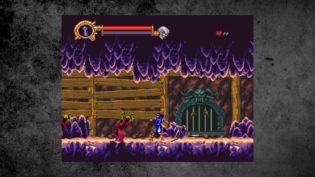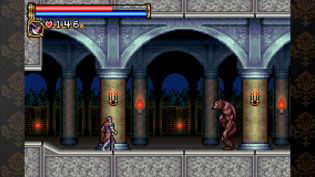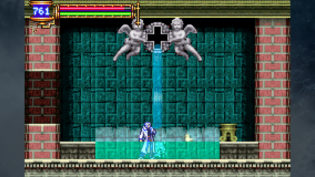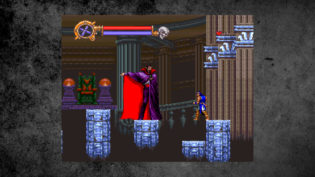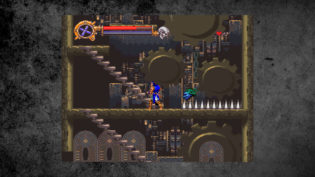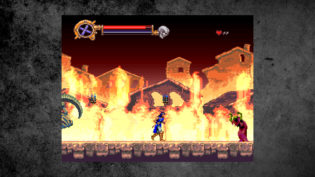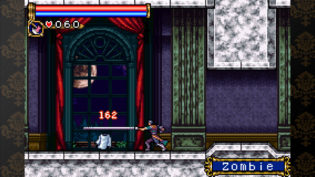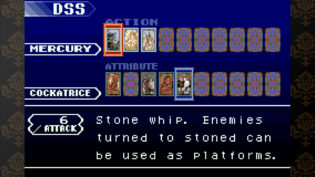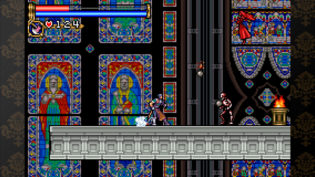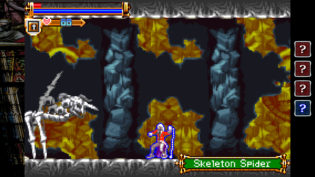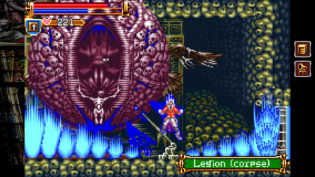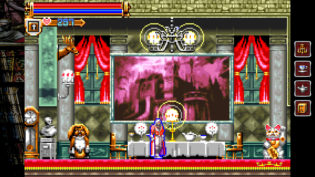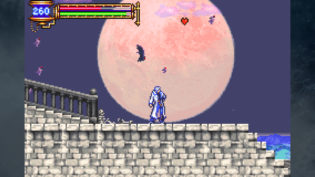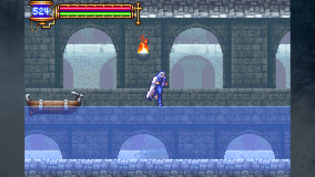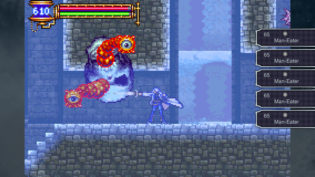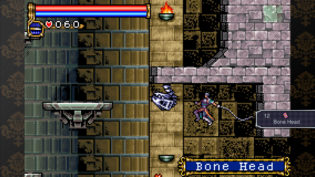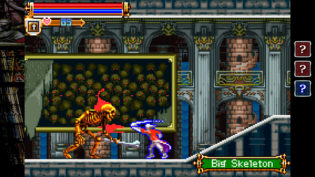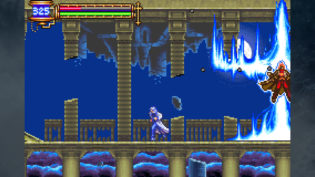O tempora is a series of retrospective posts where I play games from ages before to see if they stood the test of time.
Well, this was unexpected. After spending years locked to Game Boy Advance, a console that most people nowadays probably don’t have or use anymore, Konami has decided to release the Castlevania entries made for that console for modern platforms and most importantly PC. Oh and the SNES port of Rondo of Blood as well, for some reason. Unfortunately, this isn’t some extremely complicated NightDive Studios remaster or what Square Enix did with the Final Fantasy Pixel Remaster collection. This is just a collection of original game ROMs, wrapped in a nice emulation package with a few extras thrown in. Luckily, it’s a well made collection and playing these titles is a joy.
As mentioned, these games are the same ones that you might’ve played originally back in the day. The collection contains several regional versions of the games, which is a nice touch, as it was originally absent from the previous Castlevania collection Konami has released (but added with an update later on). It also has some artwork, the ability to listen to all of the game soundtracks and some little quality of life things. For example, each GBA title has a special widget that you can enable, that will help you track progress with the collectible elements in the game (for example, if you’ve gotten the soul of the enemy in Aria of Sorrow). There’s also a rewind button combination, which is nice and welcome and you can rebind some keys on the gamepad (though, not on the keyboard for some reason), per each game. Again – sadly, these games are exactly as they were, with no fixes to known issues or oddities, which is a shame as some of these titles are among the best metroidvanias of all time. But it’s a really well-made collection, though I personally found it more comfortable with a DualSense (or any DualShock), as controlling the games with the D-pad is the way they were originally designed. Though, perhaps, you may find the D-pad position on your controller comfortable to use as the main control input anyway.
Castlevania: Dracula X
Unlike the rest of the games, this isn’t originally a GBA game and is instead a SNES version of the PC Engine classic Rondo of Blood. It follows the same premise and works very similarly to the more advanced original, but it is a less complex game overall. There’s only one level variation, instead of two different routes, just two optional people to save for the best ending and even the levels that are similar to the ones used in the original are much simpler in layout. That said, it’s still a solid game if you’re a fan of the classic action platforming Castlevania games. As I was never a fan of those, I was glad this collection has the rewind, so I still managed to enjoy the game. As surprising as its inclusion in this collection is.
Castlevania: Circle of the Moon
The only GBA game in the collection I’ve not completed before. And replaying it now I remember why. While it has a fantastic soundtrack, does look very good emulated in higher resolution and while it does have some cool gameplay ideas, I found the game mostly frustrating. In many ways, it feels like an attempt to combine ideas from the classic Castlevania games in terms of action and controls with the more flexible and level/equipment-dependent design of Symphony of the Night. Your character has some of the more crazy movement abilities from SotN, for example, and you do gain experience and level up, along with finding items that upgrade your stats. But your weapon is always the Vampire Killer whip, the controls are rather stiff and have a delay for some actions and the action is pretty hard. Actually, no. It starts somewhat challenging and interesting, but ends up with fury inducing boss fights.
Its main “gimmick” is the collection of cards that may drop from some enemies. You can equip a pair of cards (divided into 2 rows) to get a special effect, from extending your range or increasing damage, to something akin to the “freeze beam” from Metroid series and other curious combinations. While a cool concept, the game seems to assume you’re going to always grind these as some of the boss fights feel almost impossible without some of the card combinations, despite the fact that card drop chance is completely random. Plus, the world of this game is not particularly fun to explore and I’m almost sure many people will get utterly confused about where to go next every time they’ll get a major ability unlock. I enjoyed it at the start, and I like quite a few elements from the game, but overall Circle of the Moon isn’t a very enjoyable experience. And the final boss fight design is just terrible.
Castlevania: Harmony of Dissonance
Now this one is really fun. You’re still using a Vampire Killer whip with no way to switch weapons (though you can upgrade it a bit), but the movement is so much more fluid and unlike classic Castlevania. In fact, I can’t think of any other title in the series, where you have dedicated buttons to dashing both right and left, meaning that you can use this ability all of the time, as defense and offense, and as a fun way of movement. There are no crazy collection requirements in this one too, apart from the optional “decorate the room” quest, so no need to grind for unlockables.
Though, that said, the game gets super easy rather quickly if you find a good magic combination. Personally, I don’t find it problematic, as the exploration is extremely fun, but some people might find it disappointing. What is definitely disappointing is that the look of the game was seriously simplified and as a result the game often looks older than the previous entry. It’s not super distracting, but it’s hard to ignore. That said, the soundtrack is mostly fantastic, as expected. If you like the exploration part of metroidvania games, Harmony of Dissonance might be one of the best Castlevania entries for you. I loved replaying it a lot.
Castlevania: Aria of Sorrow
I’ve always considered this one to be among not just my favorite Castlevania titles, but also one of the best metroidvania games of all time. I know, people tend to love Symphony of the Night the most, and for a good reason. That title was incredibly ambitious and has a ton of cool little details. Yet, personally, I’ve always liked Aria more. It’s a really well-made game, with fantastic soundtrack, cool locations and fun mechanics, having a lot of what made Symphony great, but in a more controlled and manageable amount. Plus, while the story is, as always for most 2D Castlevania games, primitive, the main idea behind it is really fun and it pays off really wonderfully in the end.
Its main feature is the idea of collecting souls of the killed enemies, each soul giving you one of three types of abilities (well, four, but the fourth one is almost never dropped from an enemy). One “bullet” soul, working similarly to the typical Castlevania items or one-off spells. One “guardian” soul, that works more like a summon or change form from previous games. And one “enchanted” soul, that gives you a passive ability, from stat boosting to some very unique things. And it’s really cool, as in this game some movement abilities remain equipable souls without ever becoming a permanent background unlock, making sure that some movement possibilities mean limitations to some other things you could do.
Yet, if you want to start going for the 100% of all souls, then I hope you have enough patience. Because this game gets super grindy with this and there’s nothing you can do about it. Some souls just have an incredibly low chance of dropping, even when the resulting soul is barely useful, if at all, and even with all possible boosts, you can spend hours grinding to get it. If you don’t plan to do it, though, and just wish to explore everything and get the most out of the game, it’s totally fine and is probably a more enjoyable experience anyway. I went for 100%, but still loved my time replaying Aria of Sorrow.
Overall, while I do wish this could be a complete engine port of the games with some of the benefits that you can expect from a thing like that, I’m still glad that Castlevania Advance Collection exists as it does. It’s a really good collection, with 2 good, if not ideal, and 2 fantastic titles that you should definitely check. As even for Harmony and Aria alone, this collection is worth it. I’ve had a great time playing these games and if you’re a fan of metroidvanias and didn’t have a chance to experience these games before, definitely give it a go.


